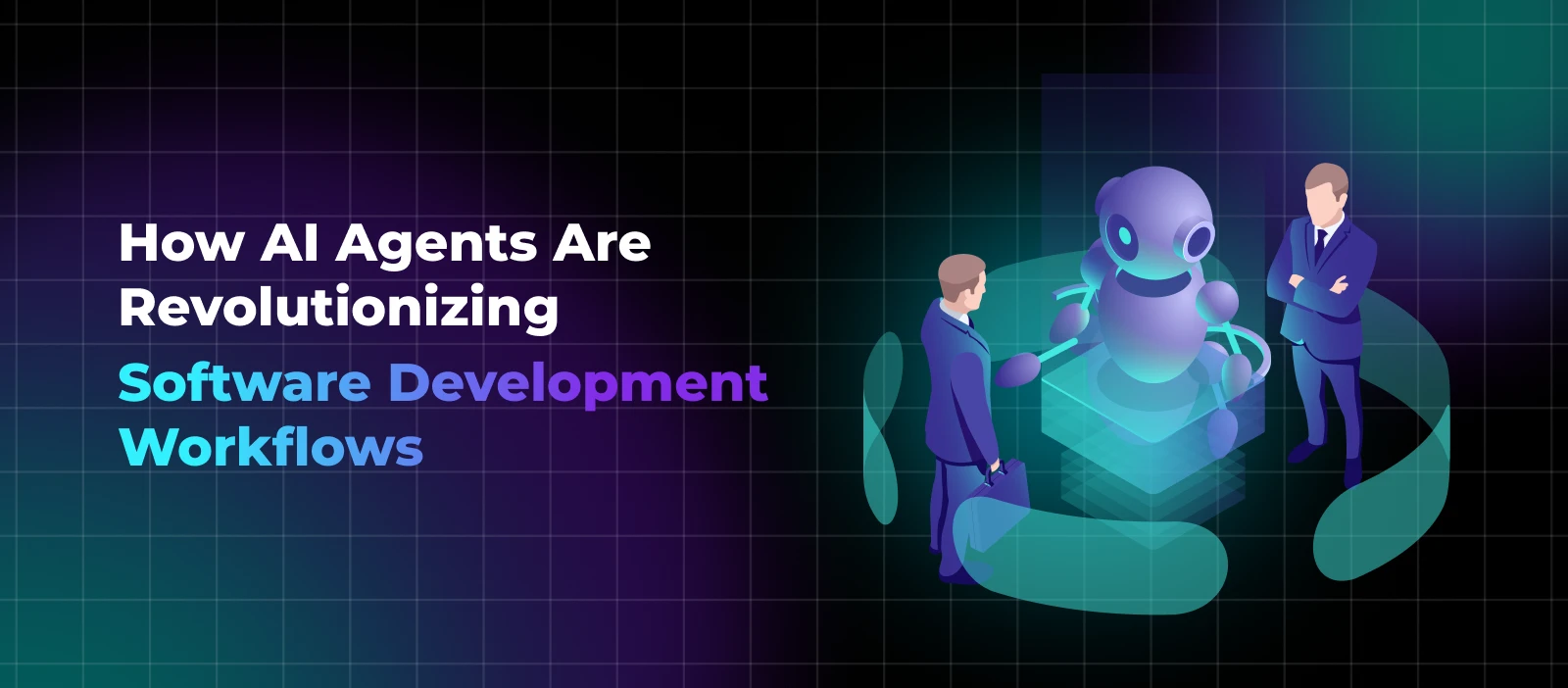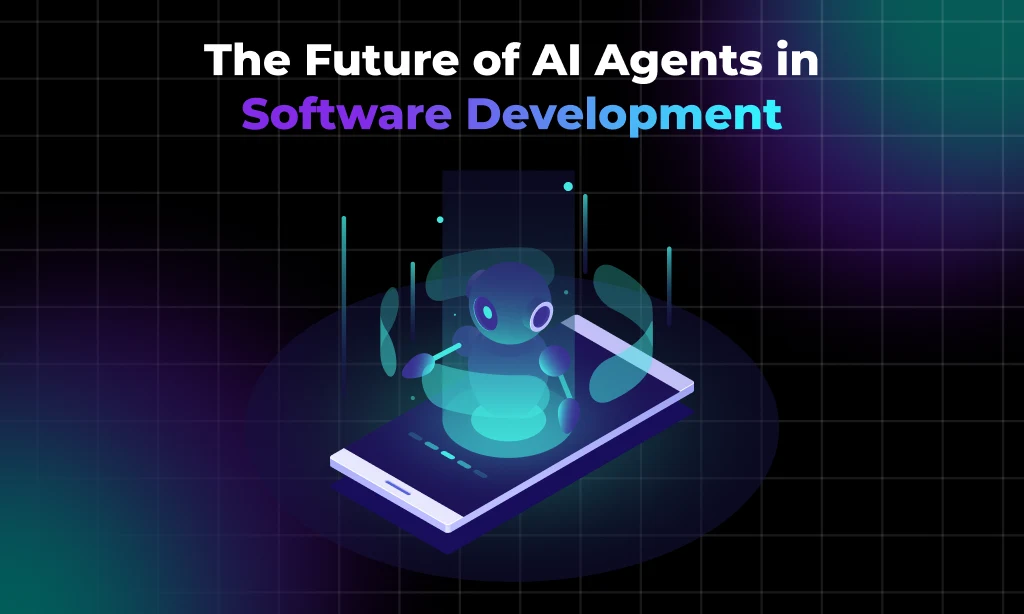How AI Agents Are Revolutionizing Software Development Workflows
September 15, 2025

Software development is not the same as it was 2-3 years ago. Traditional tools and manual processes are giving way to intelligent automation thanks to AI agents. Today, AI is in the air, and AI agents are the new wind. AI agents in software development have become a transformative force, reshaping how code is written, tested, and deployed.
These digital workers are not just automating mundane tasks; they’re becoming intelligent collaborators. AI Agents are empowering creativity, accelerating delivery, and fundamentally changing the way code is developed. It is changing the developers’ process and experience and helping with data-driven decision-making. Simply, superbots for businesses.
From simple reflex agents handling basic operations to sophisticated learning agents that adapt and evolve, the artificial intelligence evolution in software engineering represents one of the most significant technological advances of our time.
What are AI Agents?
AI agents are intelligent software designed to understand their surroundings, make autonomous decisions, and take data-driven decisions to achieve goals. They are different from traditional software programs that follow a set of rules and instructions. These intelligent agents possess the ability to learn from previous data, adapt with new insights, and operate independently within predefined parameters.
AI agents’ key characteristics are:
- Autonomy: They operate without constant human intervention
- Reactivity: They respond to changes in their environment
- Proactivity: They take the initiative to achieve their objectives
- Social Ability: They interact with other agents and humans
In software development, they act as proactive bots or, rather, digital coworkers, who can understand context, help developers make intelligent decisions, and execute complex workflows just like that. They leverage generative AI and multi-modal AI capabilities to process various types of input—from natural language requirements to code repositories, and generate meaningful outputs that advance development objectives.
Types of AI Agents
Understanding the different types of AI agents helps developers choose the right tool for specific tasks. Each category brings unique capabilities to AI-powered software development tools.
Simple Reflex Agents
Simple reflex agents operate on condition-action rules. They are quick to respond to current perceptions. In software development, they excel at:
- Code formatting and linting
- Basic syntax error detection
- Simple automated testing triggers
- Immediate notification systems
Model-Based Reflex Agents
Model-based reflex agents maintain an internal model for their environment. This allows them to make decisions based on both current and historical information. They’re particularly effective for:
- Version control management
- Dependency tracking
- Build pipeline optimization
- Environment configuration management
Goal-Based Agents
Goal-based agents work toward specific objectives, making them ideal for complex development tasks:
- Feature implementation planning
- Code optimization strategies
- Testing coverage improvement
- Performance enhancement initiatives
Utility-Based Agents
Utility-based agents evaluate multiple possible actions and choose those that maximize expected utility:
- Resource allocation optimization
- Priority-based task scheduling
- Risk assessment in deployment decisions
- Quality vs. speed trade-off management
Learning Agents
The most sophisticated category, learning agents, continuously improve their performance through experience:
- Pattern recognition in codebases
- Predictive bug detection
- Personalized development recommendations
- Adaptive workflow optimization
Benefits of AI Agents in Software Development
The integration of AI agents in software engineering delivers transformative advantages that are reshaping development practices across the industry:
Enhanced Productivity and Speed
The sole purpose of AI agents is to automate repetitive and time-consistent tasks. Task automation agents can handle routine activities like code generation, documentation creation, and testing. Studies show that development teams using AI agents report productivity increases of 30-50% in routine coding tasks.
Improved Code Quality
Self-learning AI agents continuously analyze codebases to identify patterns, suggest improvements, and detect potential issues before they become problems. These agents learn from vast repositories of code, containing best practices and identifying patterns that human reviewers might miss.
Intelligent Decision-Making
Through autonomous decision-making capabilities, AI agents can evaluate multiple variables simultaneously, considering factors like performance implications, security requirements, and maintainability when suggesting solutions. This leads to more robust and well-architected software systems.
Continuous Learning and Adaptation
Unlike static tools, self-learning agents evolve with each project, becoming more effective at understanding team preferences, coding styles, and project requirements. This adaptive capability ensures that the AI becomes increasingly valuable over time.
Cost Reduction
By automating routine tasks and reducing the time spent on debugging and maintenance, AI agents significantly lower development costs while improving overall project economics. Also, the need for less human resources in the future.
AI Agents at Work: Key Use Cases
The practical applications of software development AI agent technology span the entire development lifecycle, demonstrating their versatility and impact:
Code Generation and Completion
AI coding assistants like GitHub Copilot and Amazon CodeWhisperer serve as intelligent pair programmers, suggesting code completions, generating entire functions, and even creating code from natural language descriptions.
Example: A developer working on an e-commerce application can describe their need for a “payment processing function that handles credit cards and validates transactions,” and the AI agent generates a complete, secure implementation including error handling and logging.
Automated Testing and Quality Assurance
AI agents excel at creating comprehensive test suites, recognising edge cases, and maintaining test coverage as code evolves.
Example: An AI agent analyzes a new API endpoint and automatically generates unit tests and integration tests and even generates test data that covers various scenarios, including error conditions and boundary cases.
Bug Detection and Resolution
Advanced automation agents can identify potential bugs by analyzing code patterns, comparing against known vulnerability databases, and even suggesting fixes.
Example: During code review, an AI agent flags a potential SQL injection vulnerability in a database query function and automatically suggests parameterized query alternatives, complete with implementation examples.
Documentation and Knowledge Management
AI agents autonomously create, update, and manage technical documentation, API specifications, and knowledge bases, ensuring accuracy and consistency while reducing manual effort.
Example: As developers modify an API, the AI agent automatically updates the corresponding OpenAPI specification, generates usage examples, and creates or updates relevant documentation pages.
DevOps and Deployment Automation
Human-AI collaborative tools streamline deployment processes, monitor system performance, and automatically respond to common operational issues.
Example: An AI agent monitors application performance and automatically scales resources during traffic spikes while simultaneously notifying the development team and creating detailed incident reports.
Code Review and Optimization
AI agents provide intelligent code reviews that go beyond syntax checking to evaluate architecture, performance implications, and maintainability.
Example: When reviewing a pull request for a data processing module, an AI agent suggests more efficient algorithms, identifies potential memory leaks, and recommends design patterns that would improve scalability.
Challenges and Limitations
Despite their transformative potential, AI agents in software development face several significant challenges that organizations must carefully consider:
Trust and Reliability Issues
Thanks to the autonomous nature of AI agents, it raises questions about reliability, especially in critical systems. Developers must establish proper oversight mechanisms and understand when to rely on AI suggestions versus human judgment. Rule-based chatbots and simpler systems may be more predictable but lack the sophistication needed for complex tasks.
Integration Complexity
Incorporating AI agents into existing development workflows requires careful planning and often significant infrastructure changes. Teams must balance the benefits of AI automation with the complexity of implementation and maintenance properly.
Skill Gap and Learning Curve
Learning is ever evolving. As AI agents become more sophisticated, development teams need new skills to effectively collaborate with these systems. Understanding how to prompt, configure, and monitor AI agents becomes as important as traditional programming skills.
Security and Privacy Concerns
Security and privacy concern is a major worry when it comes to AI agents. AI agents often requiring access to codebases, documentation, and sensitive development data. Organizations must implement robust security measures to protect intellectual property while enabling AI capabilities.
Over-reliance Risks
There’s a risk of developers becoming overly dependent on AI agents, potentially losing fundamental coding skills or failing to understand the code being generated. Maintaining a balance between AI assistance and human expertise is crucial.
Quality Control and Validation
While AI agents can generate code quickly, ensuring the quality, security, and maintainability of AI-generated code requires sophisticated validation processes and human oversight. Anything that is generated by AI needs a supervision, but soon they can generate with 100% accuracy if not 99%.
The Future of AI Agents in Software Development

The future of AI agents in software development promises more than we can imagine as technology continues to evolve:
Advanced Multi-Modal Capabilities
Future AI agents will seamlessly work with various types of input and output, code, natural language, visual designs, and even voice commands. This multi-modal AI approach will enable more intuitive and flexible development workflows.
Enhanced Collaborative Intelligence
The evolution toward true Human-AI collaborative tools will see AI agents becoming more sophisticated partners rather than just tools. These systems will understand project context, team dynamics, and business objectives to provide more strategic guidance.
Autonomous Development Pipelines
We’re moving toward fully autonomous development environments where AI agents can handle entire features from specification to deployment, with human developers focusing on architecture, strategy, and innovation.
Industry-Specific Specialization
AI agents will become increasingly specialized for specific industries and use cases, incorporating domain knowledge and regulatory requirements into their decision-making processes.
Improved Learning and Adaptation
Next-generation self-learning AI agents will demonstrate more sophisticated learning capabilities, adapting not just to coding patterns but to team preferences, project constraints, and organizational goals.
Integration with Emerging Technologies
AI agents will increasingly integrate with emerging technologies like quantum computing, edge computing, and IoT, enabling new forms of intelligent software development that we can barely imagine today.
Conclusion
The integration of AI agents in software development is far more than a technological upgrade. It’s a fundamental shift in how software is conceived, created, and maintained. From simple reflex agents handling routine tasks to sophisticated learning systems that adapt and evolve, these digital workers are transforming every aspect of the development lifecycle, helping companies to update their system much faster than before.
With clear benefits such as enhanced productivity, improved code quality, intelligent decision making, and cost reduction, AI agents are delivering significant value in software development, allowing businesses to scale rapidly. This new era is faster in code production, seamless quality control and scalable.
Frequently Asked Questions
What are AI agents in software development?
AI agents in software development are intelligent systems that can autonomously perform development tasks, make decisions, and learn from experience. They range from simple automation tools to sophisticated systems capable of code generation, testing, and optimization.
How do AI coding assistants differ from traditional development tools?
AI coding assistants use machine learning to understand context, generate code from natural language descriptions, and provide intelligent suggestions. Unlike traditional tools with fixed functionality, AI assistants adapt and improve over time.
Are AI agents replacing human developers?
No, AI agents are designed to augment human capabilities rather than replace developers. They handle routine tasks and provide intelligent assistance, allowing developers to focus on creative problem-solving, architecture decisions, and strategic thinking.
What types of AI agents are most useful for software development?
Learning agents and goal-based agents tend to be most valuable for complex development tasks, while simple reflex agents excel at routine operations like formatting and basic error detection. The choice depends on specific use cases and requirements.
How can teams successfully integrate AI agents into their workflows?
Successful integration requires careful planning, training team members on AI collaboration, establishing proper oversight mechanisms, and gradually introducing AI capabilities while maintaining quality control processes.
What are the main security concerns with AI agents in development?
Key concerns include protecting intellectual property, ensuring AI-generated code security, managing access to sensitive systems, and maintaining audit trails for AI-assisted development activities.
How will AI agents evolve in the future?
Future AI agents will feature enhanced multi-modal capabilities, better collaborative intelligence, industry-specific specialization, and more sophisticated learning mechanisms that adapt to team and organizational needs.
Keep reading about
LEAVE A COMMENT
We really appreciate your interest in our ideas. Feel free to share anything that comes to your mind.
Our 16 years of achievements includes:
10M+
lines of codes
2400+
projects completed
900+
satisfied clients
16+
countries served




